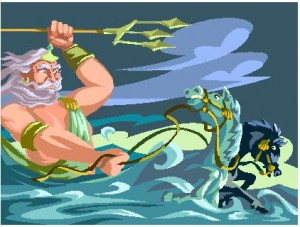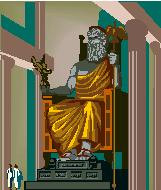As a writer, my genre of choice is hard sci-fi, and this involves a lot of research. Since I don’t have a science background (or, let’s be honest, any kind of aptitude for it at all), I sometimes feel like a fish out of water. I love that feeling. So when a fellow writer and close friend approached me a few years ago with an idea for a series of books that would delve deep into dozens of cultural and religious mythologies, I seized the opportunity.
But I had my work cut out for me, because this was an area I didn’t know much about. In other words, business as usual. Because it’s so important to write what you know, I therefore needed to acquire a lot of new knowledge. Fortunately, I absolutely adore doing research. There’s nothing quite so satisfying and exciting for me as Wiki-surfing late into the early morning hours, clicking from one link to another and amassing all manner of random trivia. Targeting that effort is a bit more work, but worthwhile in the end.
First of all, I hope I won’t offend anyone when I refer to “religious mythologies.” It would be quite impossible to write about the subject of mythology research as it pertains to my writing without broaching the subject. As a religious person myself, I don’t mean to imply that these various “mythologies” don’t also bear resemblance to truth. I use the term only to refer to systems of belief-and in the case of this particular novel I was authoring, all systems of believe. Or at least as many as possible.
My scope was necessarily broad, but I was especially concerned with the intersection of three sets of religious mythologies-Christianity, Judaism (including Kabbalah), and Paganism. I dig into a lot of others also, but for me these are the big three. And admittedly, Paganism is probably too broad to justifiably squeeze into a single term, but for the purposes of brevity, I’ll leave it at that. My goal was to dive into these mythological and look for ways to unify them.
My starting point was an ancient Hebrew text called the Sefer Yetzirah. Could it possibly have a more spine-tingling name? Sefer Yetzirah. To my ear, it sounds deliciously mysterious. Its direct English translation is “Book of Formation (Creation),” from which I derived the title for the first novel in the series. As legend has it, this short text (it’s only about four thousand words, total) was penned by Abraham, the Patriarch. The story goes something like this: Abraham sat down one day for a tête-a-tête with the Almighty, and on that day God explained to him how the world was created. This wasn’t a retread of the creation account in Genesis which so many of us learned in Sunday School; this was the nuts and bolts version, what some people refer to as “creation science.” We’re talking specific methodology, a step-by-step “Creation for Dummies” how-to guide. Except, of course, there’s a catch. There always is. Even translated into English, the whole thing is basically incomprehensible. It’s a fun read, with lots of symbology and numerology on display, but no one can claim to grasp it. Here’s a sample:
In two and thirty most occult and wonderful paths of wisdom
did JAH the Lord of Hosts engrave his name…
He created this universe by the three Sepharim, Number, Writing, and Speech.
Ten are the numbers, as are the Sephiroth, and twenty-two the letters,
these are the Foundation of all things. Of these letters,
three are mothers, seven are double, and twelve are simple.
It goes on in that vein. This is research at its most fun, surely.
So basically, I had to do a lot of reading, some of it difficult, and a lot of digging. Another text I spent much time investigating was the Book of Enoch, considered apocryphal by most modern-day Christians but a really gripping read nonetheless. In it, a number of interested mythological concepts collide-angels, demons, giants, monster, and yes, even aliens, if you turn the page and squint at it a little bit. I looked into the rest of the Apocrypha, and looked for connections between my Big Three and some of our world’s most famous myths, most notably from the Greeks and Romans, who gave us so much to work with. Not to mention Egypt! The Native populations in North and South America are also especially myth-rich, though they are often neglected for some peculiar reason; in particular, I’ve become very interested in the early Inca civilization.
There’s more. Much more than I have room here to go into… and even if I did, it would likely stretch your patience to the breaking point.
In tomorrow’s follow-up post, I’m going to spend some time to talk more about my research methodology. Be sure to stop on by!



